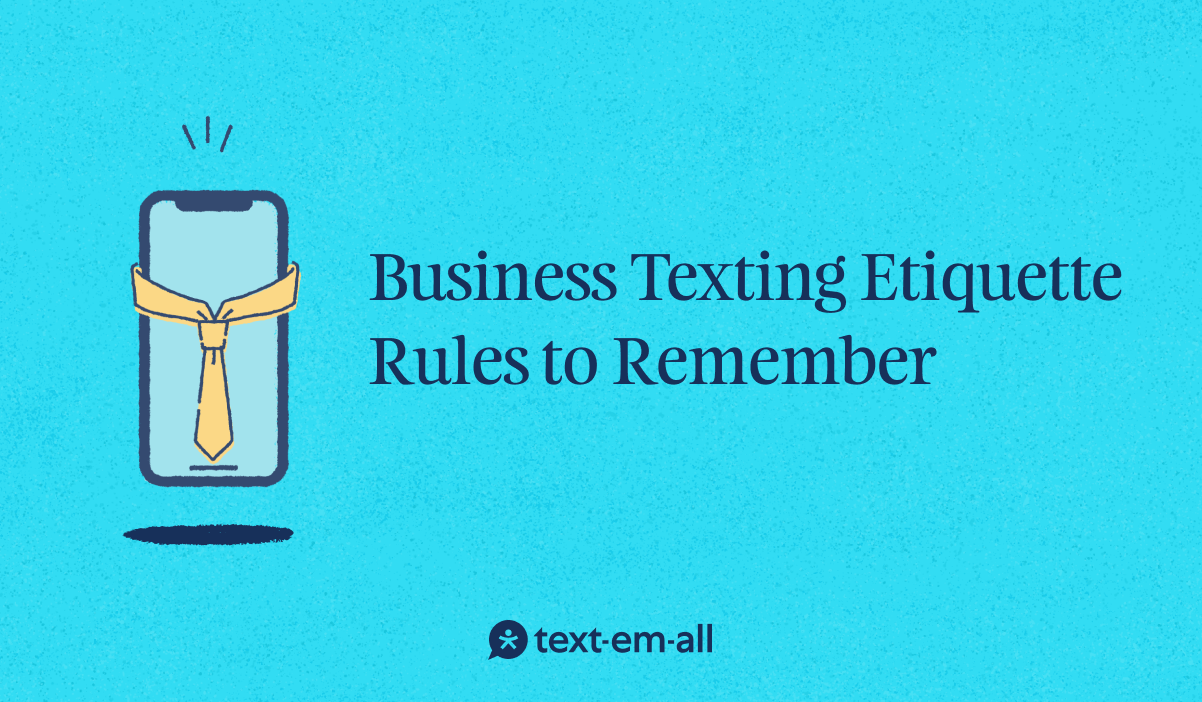
The convenience and speed of business texting make it a useful asset for quick conversations, urgent messages, and reminders. However, just like any other type of business communication, it’s important to maintain proper etiquette when sending texts. In this guide, we’ll explore the importance of professional text messaging etiquette and provide practical tips to ensure your business texts are clear, respectful, and effective.
The Importance of Professional Texting Etiquette
Texting has become a fundamental part of modern business communication due to its quick and instant contact. However, the casual nature of texting can sometimes lead to misunderstandings, which are important to avoid in a professional setting.
Poor texting etiquette can damage relationships, undermine credibility, and may even lead to legal issues in extreme cases. Therefore, professionals must understand and adhere to proper texting etiquette to maintain professionalism and avoid pitfalls.
Read: The Complete Guide to Business Text Messaging
Core Principles of Professional Text Messaging
Before diving into the specifics, let’s go over some key principles to keep in mind when writing professional text messages.
Clarity & Brevity
When communicating via text message, clarity and brevity are paramount. Keep your messages concise and to the point to ensure your intended meaning is clear and without room for misinterpretation. Avoid using overly complex language or sentences that may confuse the recipient. Additionally, be mindful of your tone to convey professionalism.
Timing
Timing is another vital aspect of professional texting etiquette. Respect the recipient's schedule and avoid sending messages outside of regular business hours unless it's absolutely necessary. Sending messages late at night or early in the morning may be perceived as intrusive or disrespectful. Similarly, be quick to respond to messages during business hours to demonstrate professionalism and responsiveness.
Respecting Privacy
Respecting a recipient's privacy is essential when initiating text communications. Avoid sending confidential or sensitive information via text messages, as they are less secure than having an in-person conversation or speaking on the phone. Always obtain consent before sending unsolicited text messages, especially in marketing or promotional contexts, to avoid appearing intrusive or spammy.
Use of Language and Emojis
The language and tone used in text messages can significantly impact how the recipient perceives them. Avoid slang or everyday expressions that may undermine your professionalism. Similarly, exercise caution when using emojis, as different individuals may interpret them differently. While emojis can add personality and levity to your messages, use them sparingly and only in appropriate contexts.
12 Dos and Don'ts of Professional Texting
Each message you send contributes to your professional reputation, which is why there are fundamental practices to consider. Here are 12 dos and don’ts to follow when texting as a business.
Do: Set Clear Expectations
Clearly communicate your text messages' purpose and expected response time, particularly in business contexts where timely communication is the standard. Setting expectations helps manage recipients' responses and reduce misunderstandings.
Don't: Use Texting for Complex Discussions
Avoid using text messages for complex or sensitive discussions that require nuance or detailed explanations. Instead, opt for face-to-face meetings, phone calls, or video conferences to ensure an effective conversation and prevent miscommunication.
Do: Use Professional Greetings and Signatures
Begin your text messages with a professional greeting, such as "Hello" or "Hi [Recipient's Name]," and include your name or initials at the end for clarity and courtesy. This simple gesture enhances professionalism and adds a human touch.
Read: 3 Examples of Why You Need To Personalize Your Mass Text Messages
Don't: Text in All Caps
Avoid typing messages in all capital letters, as people commonly perceive it as shouting or aggression. Use proper capitalization and punctuation to express your message clearly and respectfully.
Do: Seek Permission Before Adding Recipients
Before adding recipients to a group text or including individuals in a message thread, obtain their consent to ensure privacy and respect their communication preferences. Group texts can quickly become overwhelming if recipients are added without their permission.
Don't: Ignore Responses
Acknowledge and respond to text messages promptly, even if it's to confirm receipt or provide an update on when a detailed response will be available. Ignoring messages can lead to frustration and undermine professional relationships.
Do: Proofread for Accuracy and Clarity
Before hitting send, take a moment to review your message for any typos, grammatical errors, or unclear phrasing. Proofreading ensures that your message accurately conveys your intended meaning and maintains professionalism.
Don't: Resort to Text Speak or Abbreviations
Avoid using text speak or abbreviations that may be unclear or unprofessional, such as "LOL" or "BRB." Opt for full words and proper grammar to ensure clear communication and uphold a professional image.
Do: Respond Promptly During Business Hours
Demonstrate professionalism and respect for others' time by responding promptly to messages during business hours. Timely responses show that you value the sender's communication and are committed to effective collaboration.
Don't: Compromise Privacy with Sensitive Information
Avoid sharing confidential information via text messages. Texts are inherently less secure than other forms of communication, so refrain from sending sensitive data that could compromise privacy.
Do: Prioritize Proper Grammar and Punctuation
Be as grammatically correct as possible to maintain professionalism in your text messages. Clear and coherent messages enhance readability and reinforce trust in recipients.
Don't: Overdo Emojis or Informal Language
While emojis can be a fun addition to your messages, avoid overusing them or using informal language that may undermine your professionalism. Finding a balance between friendliness and professionalism maintains credibility in your communication.
Business Texting Etiquette Across Different Scenarios
Texting etiquette may vary depending on the specific business scenario. For example, texting may be more informal for internal communications, such as team updates or meeting reminders. However, when texting with clients or external partners, it's best practice to maintain a higher level of professionalism.
In recruitment scenarios, texting can be an effective tool for scheduling interviews or providing updates to candidates. To put your best foot forward, ensure your tone and message content align with the company's brand and values.
Navigating Difficult Conversations Over Text
While text messaging is convenient for quick exchanges, it's not always the most appropriate medium for handling sensitive or challenging topics. If you find yourself in a situation where a difficult conversation is necessary, consider suggesting an in-person meeting, video call, or phone conversation instead. These channels allow for more nuanced communication and reduce the risk of misunderstandings from text-based communication.
Best Practices for Implementing Professional Texting Policies
When implementing professional texting policies within your organization, it's imperative to establish clear guidelines and expectations. Here are some best practices to enforce consistent adherence to professional texting etiquette:
- Establish clear policies and guidelines for professional texting within the organization.
- Educate employees on the importance of professional texting etiquette and effective communication practices.
- Provide training to employees on how to communicate professionally via text messages.
- Implement measures to monitor and enforce texting policies, including regular audits and feedback mechanisms.
- Promote a culture of professionalism and accountability to enhance communication efficiency and mitigate risks associated with poor texting etiquette.
Conclusion
Professional text messaging etiquette is necessary to maintain professionalism, build strong relationships, and avoid misunderstandings in business communication. By sticking to core principles such as clarity, timing, and respect for privacy, professionals can leverage text messaging as a valuable tool for effective communication.
If you’re looking for a professional texting solution, why not try Text-Em-All? We help thousands of organizations send business text messages daily, and our award-winning Customer Experience team is always here to help. To get started, create your free account today.












